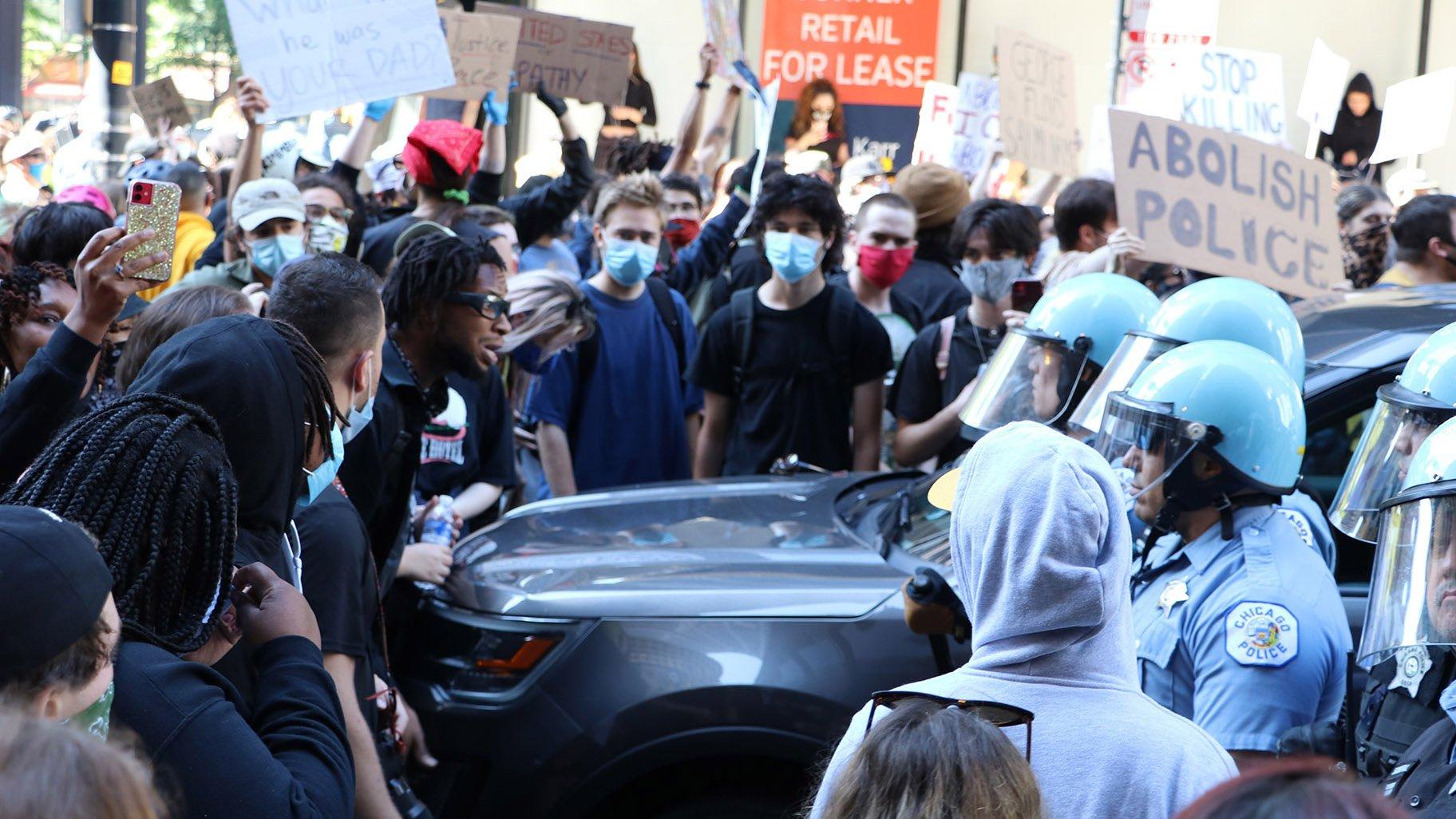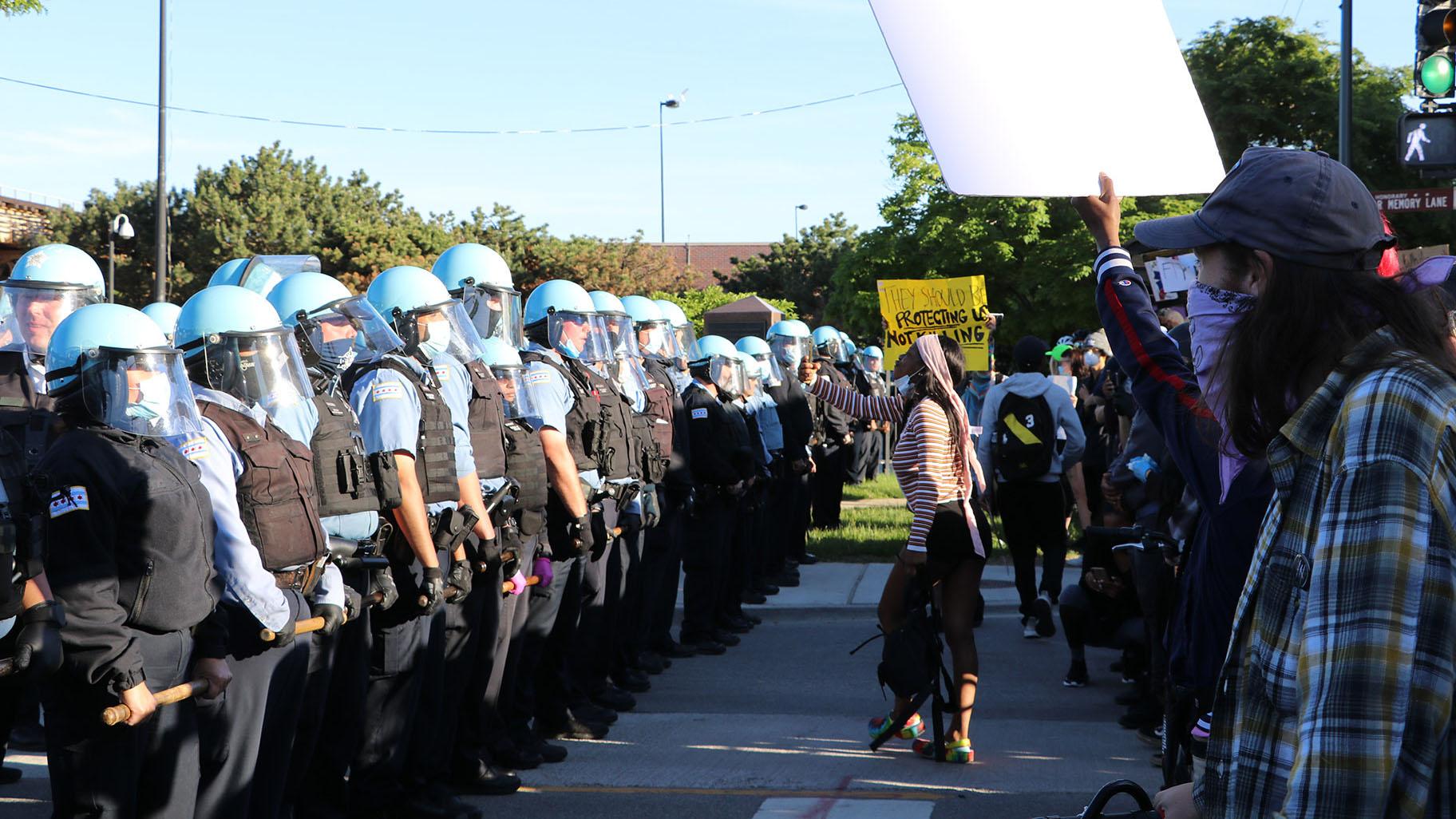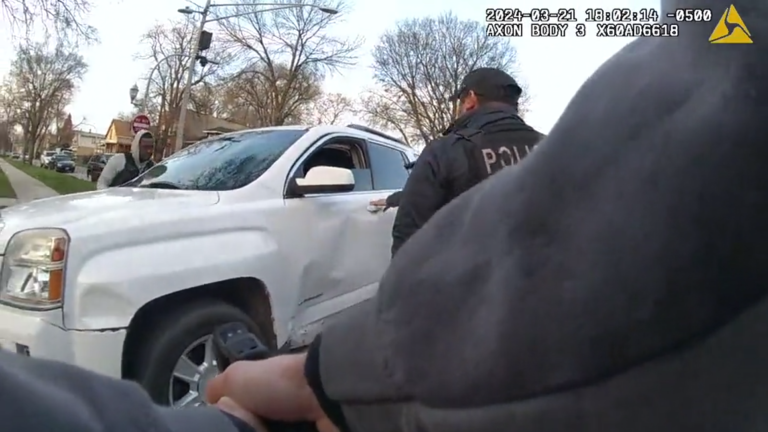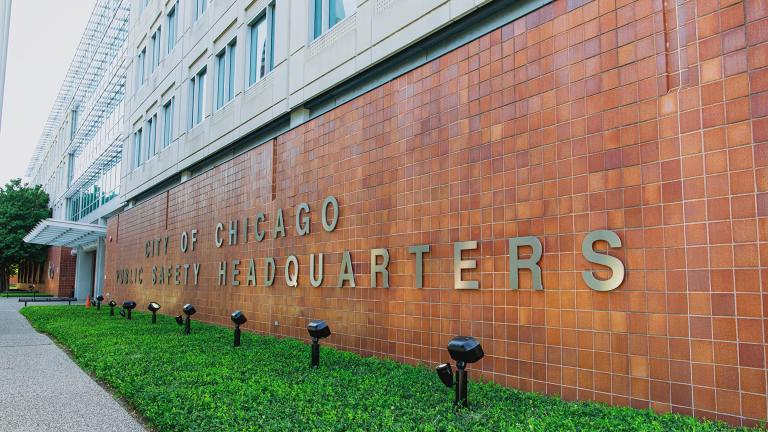 Protesters and police officers wearing riot gear have a standoff near Daley Plaza on Saturday, May 30, 2020. (Evan Garcia / WTTW News)
Protesters and police officers wearing riot gear have a standoff near Daley Plaza on Saturday, May 30, 2020. (Evan Garcia / WTTW News)
Chicago taxpayers paid $99,000 to resolve a federal lawsuit filed by a former Chicago Police sergeant who said her commanding officer retaliated against her after she complained about being ordered to patrol his Bridgeport block during the unrest that swept Chicago in the wake of the police murder of George Floyd, according to city records obtained by WTTW News.
Former Chicago Police Sgt. Cassandra Williams, who worked for the Chicago Police Department for 32 years, retired after the harassment and retaliation she said she endured caused her such significant stress that she became ill as she watched as her career “went down the drain” in 2021.
“I crossed the blue line,” Williams said, referring to the so-called “code of silence” that keeps Chicago Police officers from complaining about misconduct by other officers, even when it puts members of the public at risk.
Lt. Jason Brown, who earns $154,074 annually, remains a member of the Chicago Police Department’s leadership, charged with supervising officers in the Deering (9th) Police District who patrol Back of the Yards, Brighton Park, McKinley Park and Bridgeport.
Chicago officials resolved two lawsuits in 2023 that alleged Brown retaliated against officers under his command, and a third lawsuit is pending. A spokesperson for Mayor Brandon Johnson and representatives of the Chicago Police Department declined to answer a question from WTTW News about why Brown remains a Chicago Police lieutenant in good standing.
Taxpayers paid former Chicago Police Officer Xavier Chism $85,000 after he sued the city alleging that he also faced retaliation from Brown. According to Chism’s lawsuit, Brown and another officer used a CPD database to search for personal information about Chism in violation of department rules.
When the unauthorized search was flagged, Chism refused to tell department investigators that Brown had his permission to conduct the search. In retribution, Brown blocked Chism’s appointment to a prestigious task force, according to the lawsuit. Chism is no longer a member of the Chicago Police Department, records show.
Brown told WTTW News that the city’s decision to settle the lawsuits brought by Williams and Chism should not be interpreted as an admission that he did anything wrong. Before both cases were settled, Brown was dismissed as a defendant by the judges in the case, as is typical in cases that allege city officials and police brass did nothing to stop misconduct by individual officers as part of a pattern or practice allowed to take root in the department.
“If it was up to me, I would have fought to the bitter end,” Brown said.
Had the payment to resolve Williams’ lawsuit been $1,001 more, it would have required City Council approval under city rules, ensuring a public discussion of the allegations made against Brown and the department’s handling of the civil unrest. Chicago’s watchdog found CPD botched nearly every aspect of its response to the protests and unrest.
When asked to respond to Williams’ specific claims of retaliation, Brown said Williams was “full of s---.”
“She’s no longer with CPD,” Brown said. “She can lie and say whatever she wants.”
Brown is not facing discipline for violating department rules that prohibit officers from retaliating against those who report misconduct or harassing other officers. However, after working as the acting commander of CPD’s narcotics division, Brown was returned to duty at the rank of lieutenant.
“To see him working as a lieutenant is very frustrating,” Williams said. “Who is protecting him?”
Marc Vanek, another officer who reported to Brown, was the first officer to complain about Brown’s actions to department leaders on June 4, 2020. In September 2021, Vanek sued Brown and the city in Cook County court, making allegations that are nearly identical to those lodged by Williams in her lawsuit. Since filing that lawsuit, which is pending, Vanek has been promoted from sergeant to lieutenant by CPD, and earns $149,502 annually, according to city records.
Brown called the lawsuit filed by Vanek “frivolous” and “not worth the paper it’s printed on.”
After Brown spoke with WTTW News, CPD spokesperson Tom Ahern asked WTTW News not to publish Brown’s statements since he spoke without obtaining authorization from police brass. Ahern said he did not want Brown to get in trouble for violating departmental rules.
As the conversation was on the record, WTTW News is including Brown’s comments.
CPD officials did not respond to a series of questions about whether Ahern’s request was approved and in line with department rules and whether it was intended to protect Brown from facing disciplinary charges.
Williams alleges in her lawsuit that Brown has been protected by high-ranking departmental officials.
Initially, a report of settlements and judgments that was released by the Chicago Department of Law misidentified Williams’ lawsuit — using an incorrect case number, an incorrect first name and a misspelled last name. Those errors were corrected after being identifed by WTTW News.
Since joining the Chicago Police Department in 1997, Brown has faced 51 misconduct complaints, more than 98% of every other Chicago Police Department officer. Just one allegation was sustained, stemming from a 2004 complaint, resulting in a suspension of one day for “operational/personnel violations,” according to the database of misconduct complaints compiled by the Invisible Institute.
 Protesters yell at a line of police officers at State and 35th streets, about 3 miles south of the Loop, where police set up a blockade on Sunday, May 31, 2020. (Evan Garcia / WTTW News)
Protesters yell at a line of police officers at State and 35th streets, about 3 miles south of the Loop, where police set up a blockade on Sunday, May 31, 2020. (Evan Garcia / WTTW News)
A Career Upended
The series of events that would end Williams’ three-decades-long career as a police officer began on June 2, 2020, as members of the Chicago Police Department struggled to respond to the protests and unrest triggered by the May 25 murder of George Floyd by a Minneapolis Police officer.
Williams was one of hundreds of officers who reported to a parking lot outside Guaranteed Rate Field, the home stadium of the Chicago White Sox, to get their assignment during the unrest that shook Chicago.
But instead of being assigned to patrol areas of the South and West sides where dozens of businesses were being looted, Williams said she and her team of eight officers were instead sent to patrol the Bridgeport block where Brown lived.
According to Williams’ lawsuit, Brown shared a text message with her sent by one of his neighbors, the wife of a retired police officer, alerting Brown that she saw a “raggedy” car with two Black men driving down their street in a suspicious manner while taking photos and a video.
At that time, some residents of neighborhoods like Bridgeport — home to many Chicago police officers, firefighters and other city workers — feared that the unrest would spill into their majority White, residential neighborhoods.
During a virtual meeting with then-Mayor Lori Lightfoot, now-convicted former Ald. Patrick Daley Thompson, who lived in Bridgeport at the time, told her he was worried that “looters” would attack homes in his neighborhood where many people have guns and concealed carry weapons.
Those fears were never realized.
From June 2-8, six of the most violent days in Chicago’s modern history, Williams and her team’s only assignment was to patrol a single Bridgeport block, “where there was literally nothing for her to do” except eat home-baked cookies and enjoy being showered with affection by the grateful residents, according to her lawsuit.
But Williams said she and her team grew frustrated, and asked to be allowed to help their fellow officers who had days off canceled and were working under difficult conditions. Brown denied those requests, according to the lawsuit.
When word began to spread in the department that Brown ordered officers under his command to protect his block, Williams said Brown told her to “keep her mouth shut.” Williams said she did, but found herself being targeted by Brown anyway, forced to work night shifts and removed from supervisory roles and required to handle paperwork and answer phone calls.
“I had been uncomfortable about what happened during the unrest since I saw the scope of the destruction,” Williams said. “I felt like I had deceived the people of Chicago.”
After struggling with her conscience, Williams filed a complaint with Chicago’s watchdog in May 2021, and spoke with the Chicago Tribune in June 2021.
Nearly four years later, the inspector general’s probe has not been publicly resolved. A spokesperson for Inspector General Deborah Witzburg declined to comment on the status of the probe, and did not answer questions about why it had taken so long.
Williams said until Brown started retaliating against her, she loved being a Chicago Police officer and relished helping Chicagoans. But soon, Williams said, she was “dying on the inside.”
“I didn’t want to leave but I had to,” Williams said. “It wasn’t fair then and it isn’t fair now.”
Contact Heather Cherone: @HeatherCherone | (773) 569-1863 | [email protected]








